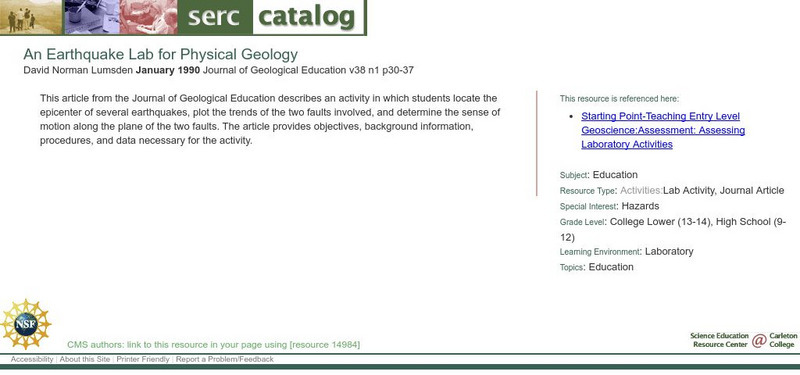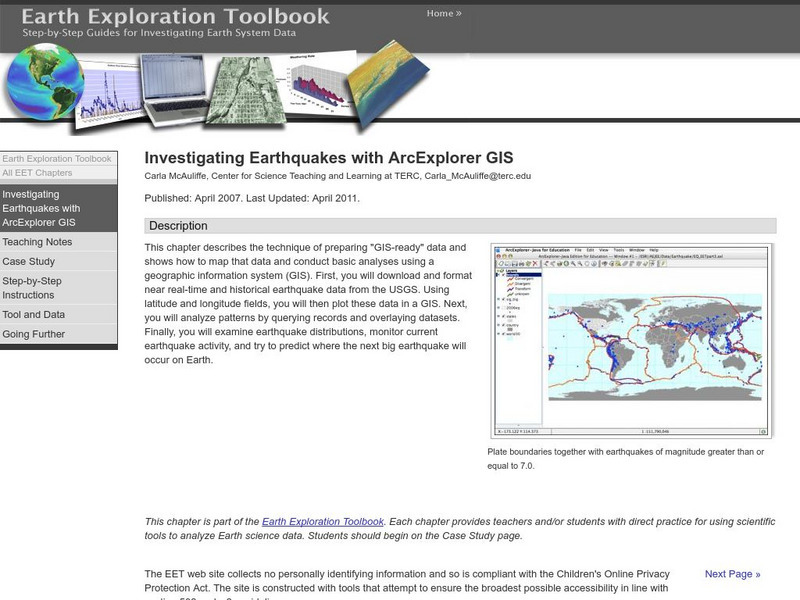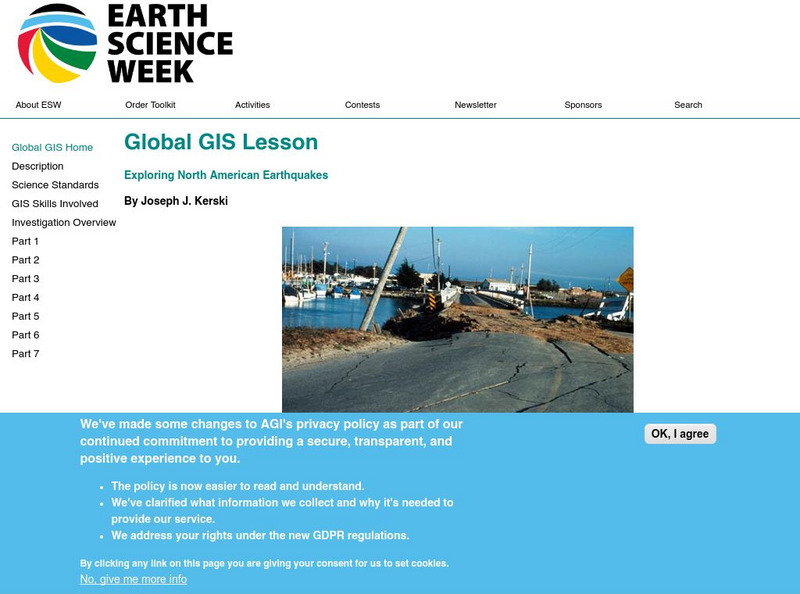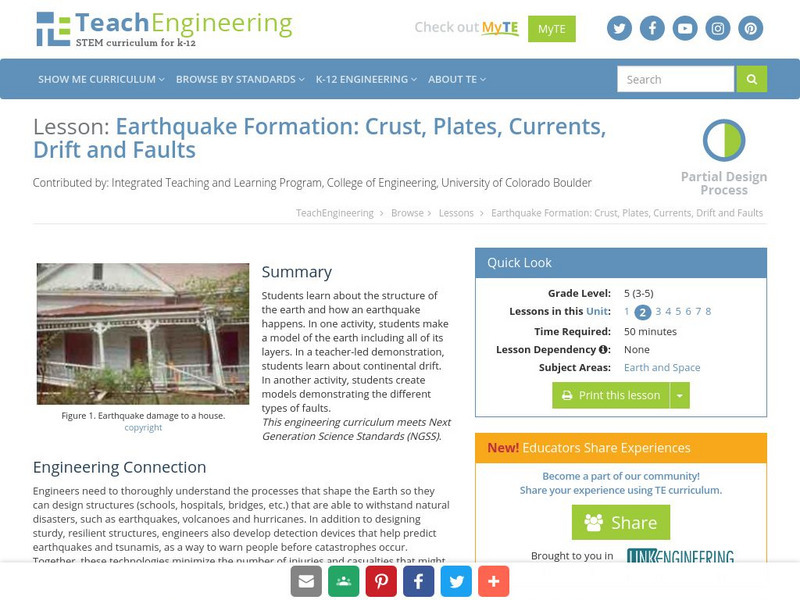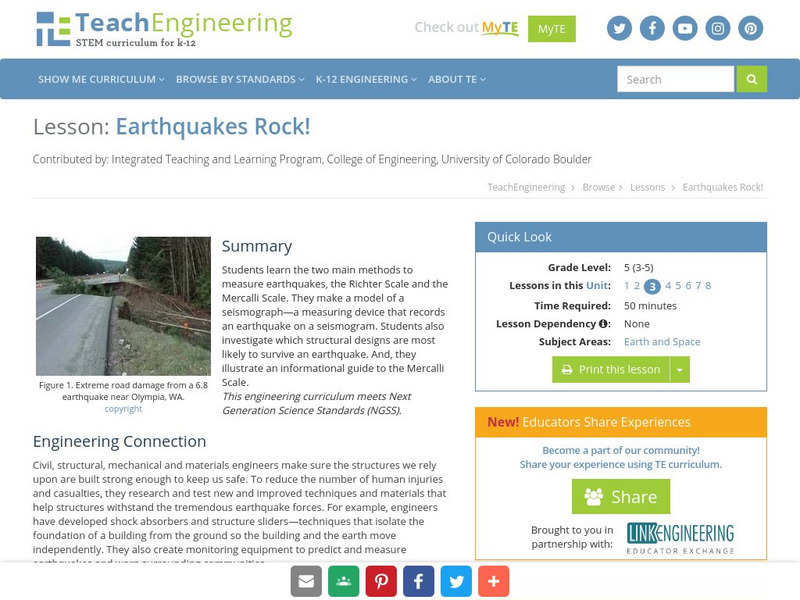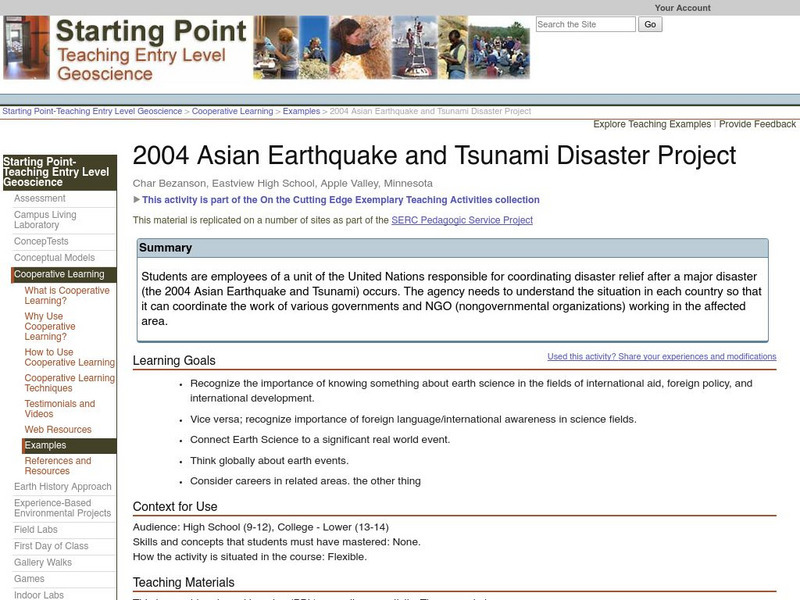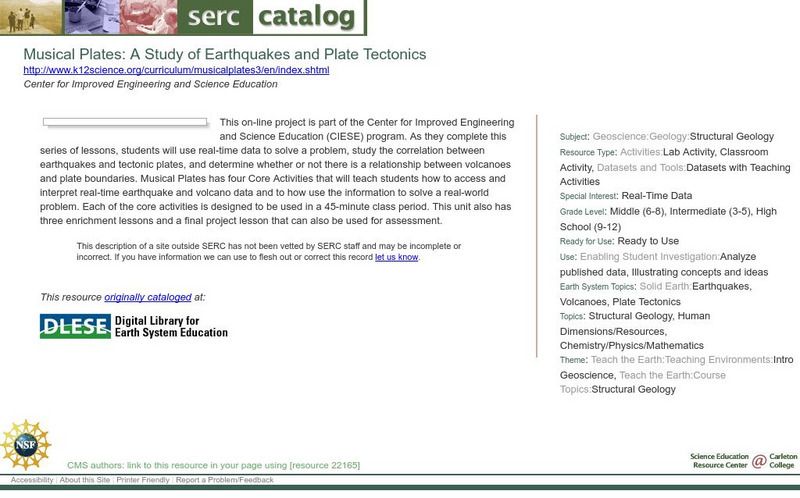Hi, what do you want to do?
Science Buddies
Science Buddies: Set Your Table for a Sweet and Sticky Earthquake Shake
Earthquakes can have different affects depending on their location. This week long exercise asks you to build a model house and a special table to shake it on, and see how different soil types can amplify shaking.
University of Wisconsin
Scien Count Ers: Earthquake Proof Buildings
This instructional activity looks at how the forces of an earthquake impact on buildings, and different ways to make buildings earthquake-proof. Includes student worksheet and tectonic plates map.
Texas State Historical Association
Texas State Historical Association: Notable Earthquakes Shake Texas [Pdf]
An activity guide where young scholars refer to the Texas Almanac, which is free to download, for information needed to complete assigned tasks. In this lesson, they research earthquakes that have taken place in Texas, and the risk of...
Science Education Resource Center at Carleton College
Serc: Bot Ec: Energy Released in an Earthquake
A magnitude 8.5 earthquake (such as the 1964 Good Friday earthquake in Alaska) releases about 1x1018 joules of energy. The atomic bomb exploded over Hiroshima released about 1.5x1013 joules of energy. How many Hiroshima bombs would one...
Incorporated Research Institutions for Seismology
Iris: Earthquake Machine 3 Earthquake Prediction: Adi Style Activity
Learners work in small groups to use a physical model, the earthquake machine, to examine the occurrence of earthquakes and the inputs and outputs of fault systems.
Incorporated Research Institutions for Seismology
Iris: Earthquake Machine 1 Defining an Earthquake
In this activity, learners work collaboratively in small groups to investigate the earthquake cycle using a mechanical model.
Science Education Resource Center at Carleton College
Serc: An Earthquake Lab for Physical Geology
This article from the Journal of Geological Education describes an activity in which students locate the epicenter of several earthquakes, plot the trends of the two faults involved, and determine the sense of motion along the plane of...
National Association of Geoscience Teachers
Nagt.org: A Kinesthetic Demonstration for Locating Earthquake Epicenters
A kinesthetic activity for students to understand the technique for locating the epicenter of an earthquake. It is performed indoors and outdoors in three lessons.
Science Education Resource Center at Carleton College
Serc: Plotting Earthquakes With Near Real Time Data
This lesson teaches the concept of plate tectonics. Students will access the United States Geological Survey National Earthquake Information Center and plot the longitude latitude and depth of earthquakes on a physiographic chart.
Science Education Resource Center at Carleton College
Serc: Investigating Earthquakes With Arc Explorer Gis
This activity allows students to predict future earthquake activity by interpreting the results of geographic information system (GIS) analysis.
American Geosciences Institute
American Geosciences Institute: Earth Science Week: Global Gis Lesson: Exploring North American Earthquakes
In this series of lessons, learners use Geographic Information Systems (GIS) together with the tools and data from the North America Global GIS CD to investigate earthquakes, volcanoes, and population from a local to global scale....
TeachEngineering
Teach Engineering: Earthquake Formation
Learners learn about the structure of the earth and how an earthquake happens. In one activity, students make a model of the earth including all of its layers. In a teacher-led demonstration, learners learn about continental drift. In...
Incorporated Research Institutions for Seismology
Iris: Earthquake Magnitude Modeling With Pasta Quake
Using only strands of spaghetti, you and your class can explore the amount of energy released for each level of the earthquake magnitude scale.
TeachEngineering
Teach Engineering: Seismic Waves: How Earthquakes Move the Earth
Students learn about the types of seismic waves produced by earthquakes and how they move the Earth. The dangers of earthquakes are presented as well as the necessity for engineers to design structures for earthquake-prone areas that are...
Science Education Resource Center at Carleton College
Serc: The 2004 Sumatra Earthquake and Tsunami
Using real seismic recordings from a number of seismic stations, students find the location of the epicenter of the 2004 Sumatra earthquake. They next determine the path of the tsunami triggered by it, and calculate how much lead time...
PBS
Pbs Learning Media: Global Earthquakes Activity and Seafloor Features
Students will examine patterns between volcanic activity and seafloor features. NASA tracked volcanic activity for 15 years and created an animated map from their data. Compare this map to a map of seafloor features to reveal interesting...
PBS
Pbs News Hour Extra: Preparing for the Ongoing Impact of Tsunamis and Earthquakes
Using geologist's tools and the lessons from the historic Japan earthquake of 2011, learners predict when a disaster will hit and the need for disaster preparedness in communities.
Science Buddies
Science Buddies: Build an Earthquake Resistant House
In this project, students will build model earthquake-resistant buildings and measure their movement during a simulated earthquake using a mobile phone and a sensor app.
Better Lesson
Better Lesson: Building an Earthquake Resistant Structure
How can you use the engineering design process to build a structure that can stand up to an earthquake?
Ruth Patrick Science Education Center
Ruth Patrick Science Education Center: Shaking It Up With Earthquake Engineering
Students will learn basic information about earthquakes and their impact. They then follow the engineering design process as they construct earthquake-resistant buildings using toothpicks and marshmallows. The buildings are tested using...
Scientific American
Scientific American: Earthquake Proof Engineering for Skyscrapers
Students construct a shake table, then build towers of different heights using Lego blocks, and test their stability on this platform. Next, they test towers with different sized bases, and towers made using different materials.
TeachEngineering
Teach Engineering: Earthquakes Rock!
Students learn the two main methods to measure earthquakes, the Richter Scale and the Mercalli Scale. They make a model of a seismograph - a measuring device that records an earthquake on a seismogram. Students also investigate which...
Science Education Resource Center at Carleton College
Serc: 2004 Asian Earthquake and Tsunami Disaster Project
Students are employees of a unit of the United Nations responsible for coordinating disaster relief after a major disaster (the 2004 Asian Earthquake and Tsunami) occurs. The agency needs to understand the situation in each country so...
Science Education Resource Center at Carleton College
Serc: Musical Plates: A Study of Earthquakes and Plate Tectonics
Four part lab activity involves learners using real-time data to solve a problem, study the correlation between earthquakes and tectonic plates, and determine whether or not there is a relationship between volcanoes and plate boundaries.
Other popular searches
- Volcanoes and Earthquakes
- San Francisco Earthquake
- Earthquake Proof Buildings
- Indian Ocean Earthquake
- Earthquakes and Epicenter
- Web Quest Earthquakes
- Plotting Earthquakes
- Earthquake Lab
- Earthquake Vocabulary
- Volcanoes Earthquakes
- Earthquake Safety
- Earthquakes Epicenters







![Texas State Historical Association: Notable Earthquakes Shake Texas [Pdf] Lesson Plan Texas State Historical Association: Notable Earthquakes Shake Texas [Pdf] Lesson Plan](https://static.lp.lexp.cloud/images/attachment_defaults/resource/large/FPO-knovation.png)



